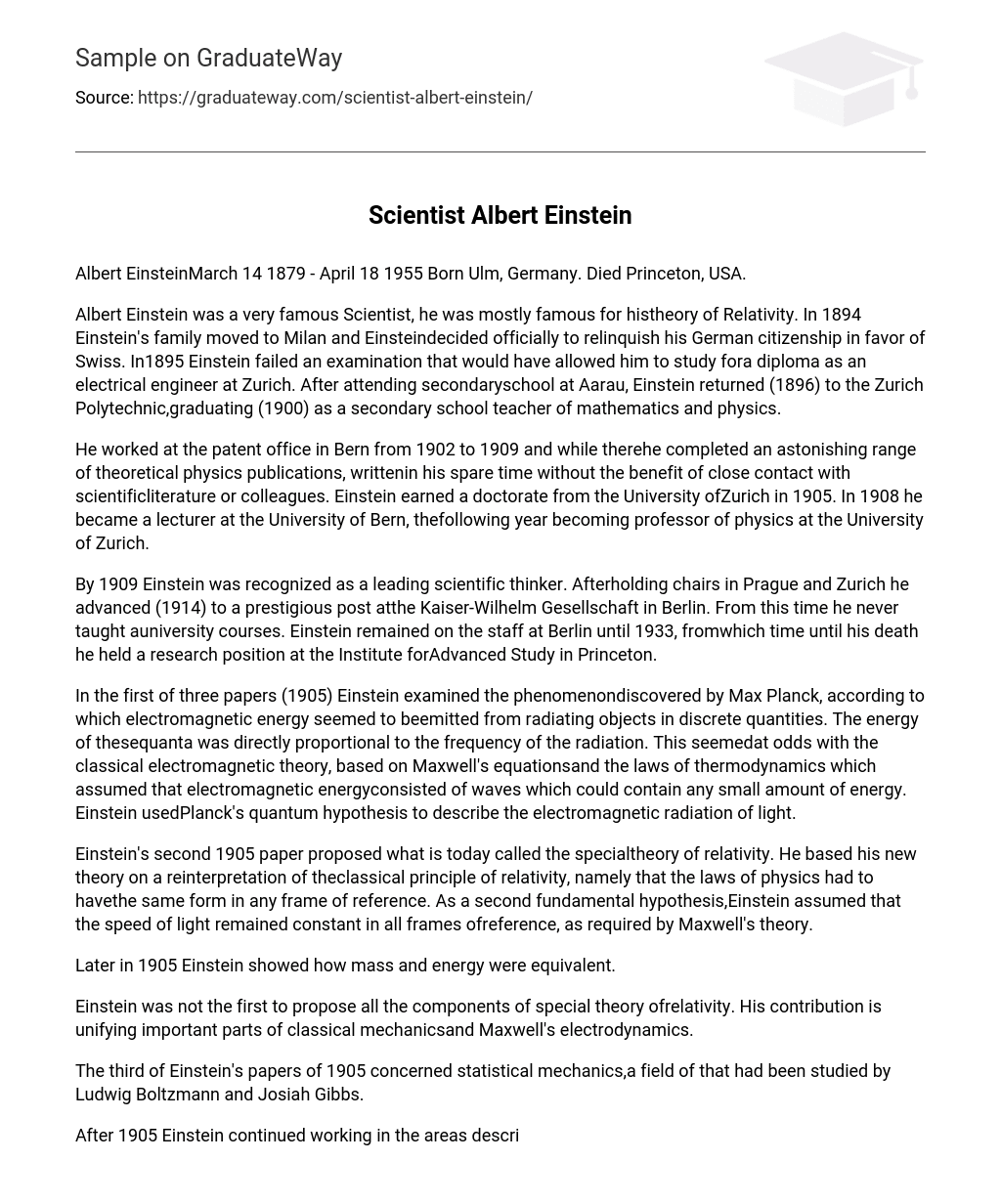Albert Einstein March 14 1879 – April 18 1955 Born Ulm, Germany. Died Princeton, USA.
Albert Einstein was a very famous Scientist, he was mostly famous for histheory of Relativity. In 1894 Einstein’s family moved to Milan and Einsteindecided officially to relinquish his German citizenship in favor of Swiss. In1895 Einstein failed an examination that would have allowed him to study fora diploma as an electrical engineer at Zurich. After attending secondaryschool at Aarau, Einstein returned (1896) to the Zurich Polytechnic,graduating (1900) as a secondary school teacher of mathematics and physics.
He worked at the patent office in Bern from 1902 to 1909 and while therehe completed an astonishing range of theoretical physics publications, writtenin his spare time without the benefit of close contact with scientificliterature or colleagues. Einstein earned a doctorate from the University ofZurich in 1905. In 1908 he became a lecturer at the University of Bern, thefollowing year becoming professor of physics at the University of Zurich.
By 1909 Einstein was recognized as a leading scientific thinker. Afterholding chairs in Prague and Zurich he advanced (1914) to a prestigious post atthe Kaiser-Wilhelm Gesellschaft in Berlin. From this time he never taught auniversity courses. Einstein remained on the staff at Berlin until 1933, fromwhich time until his death he held a research position at the Institute forAdvanced Study in Princeton.
In the first of three papers (1905) Einstein examined the phenomenondiscovered by Max Planck, according to which electromagnetic energy seemed to beemitted from radiating objects in discrete quantities. The energy of thesequanta was directly proportional to the frequency of the radiation. This seemedat odds with the classical electromagnetic theory, based on Maxwell’s equationsand the laws of thermodynamics which assumed that electromagnetic energyconsisted of waves which could contain any small amount of energy. Einstein usedPlanck’s quantum hypothesis to describe the electromagnetic radiation of light.
Einstein’s second 1905 paper proposed what is today called the specialtheory of relativity. He based his new theory on a reinterpretation of theclassical principle of relativity, namely that the laws of physics had to havethe same form in any frame of reference. As a second fundamental hypothesis,Einstein assumed that the speed of light remained constant in all frames ofreference, as required by Maxwell’s theory.
Later in 1905 Einstein showed how mass and energy were equivalent. Einstein was not the first to propose all the components of special theory ofrelativity. His contribution is unifying important parts of classical mechanicsand Maxwell’s electrodynamics. The third of Einstein’s papers of 1905 concerned statistical mechanics,a field of that had been studied by Ludwig Boltzmann and Josiah Gibbs.
After 1905 Einstein continued working in the areas described above. Hemade important contributions to quantum theory, but he sought to extend thespecial theory of relativity to phenomena involving acceleration. The keyappeared in 1907 with the principle of equivalence, in which gravitationalacceleration was held to be indistinguishable from acceleration caused bymechanical forces. Gravitational mass was therefore identical with inertial mass.
By 1911 Einstein was able to make preliminary predictions about how aray of light from a distant star, passing near the Sun, would appear to be bentslightly, in the direction of the Sun.
About 1912, Einstein began a new phase of his gravitational research, withthe help of his mathematician friend Marcel Grossmann, by expressing his workin terms of the tensor calculus of Tullio Levi-Civita and Gregorio Ricci-Curbastro. Einstein called his new work the general theory of relativity. After a number of false starts he published, late in 1915, the definitiveversion of general theory.
When British eclipse expeditions in 1919 confirmed his predictions,Einstein was idolised by the popular press. Einstein returned to Germany in1914 but did not reapply for German citizenship. Einstein received the NobelPrize in 1921 but not for relativity rather for his 1905 work on thephotoelectric effect . He worked at Princeton on work which attempted to unify the laws of physics.





